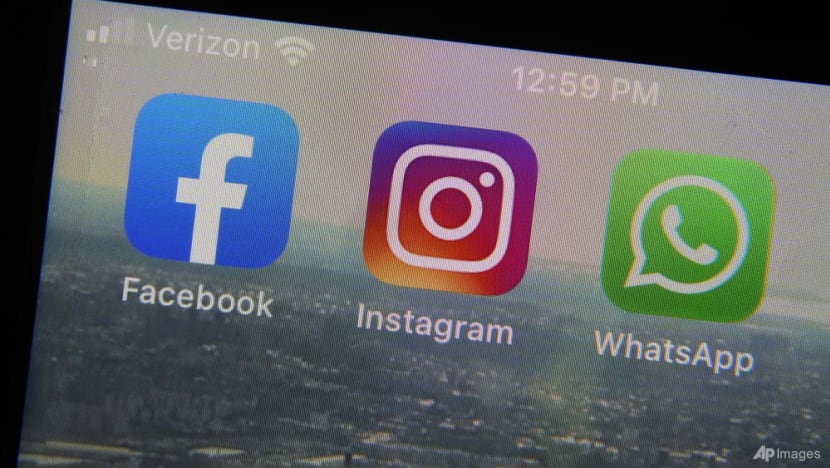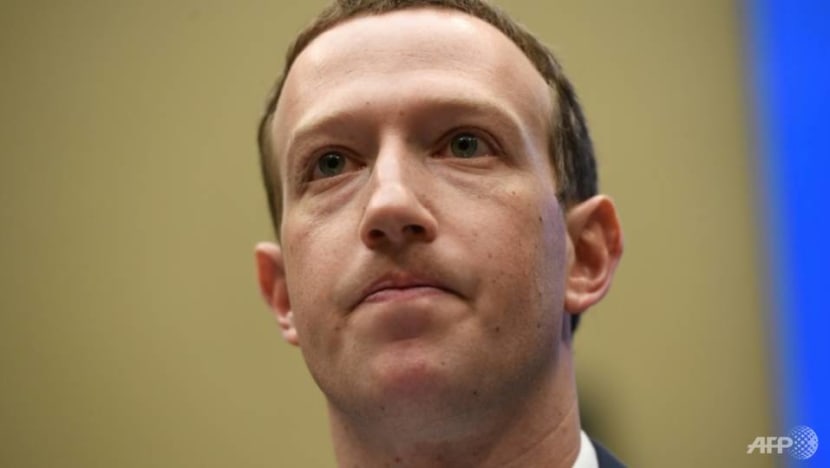Commentary: Mark Zuckerberg’s big bet on WhatsApp might not pay off
In the Meta universe, WhatsApp has been more of a defensive ploy and earnings void. Now the app’s real value will likely come from something more ignoble than making money as a viable business, says Bloomberg's Parmy Olson.

FILE - This Tuesday, Oct. 5, 2021 file photo shows the mobile phone app logos for, from left, Facebook, Instagram and WhatsApp in New York. (Photo: AP/Richard Drew, File)
LONDON: Mark Zuckerberg will probably wish he was hydrofoiling in Hawaii on Wednesday instead of revealing Meta Platforms Inc’s second-quarter earnings.
Analysts have curbed their estimates for the social giant, and Zuckerberg’s own foreboding comments to staff suggest the numbers won’t be good. He also will have to face a stark reality about the aimlessness of WhatsApp, his biggest investment to date.
Challenges abound across Zuckerberg’s conglomerate. Instagram is mired in trying to copy ByteDance Inc’s TikTok, with mixed success. Young people don’t want to use Facebook, whose overall growth has slowed, and Apple Inc is blocking advertisers on Facebook’s app from targeting people.
But then there’s WhatsApp. The little green app that never really went mainstream in the US is the most popular messaging service for most of the rest of the world.
Approximately 2 billion people actively use WhatsApp, but in Zuckerberg’s universe it has been more of a defensive ploy and earnings void than a money maker like Instagram.
WHATSAPP NEVER BECAME A VIABLE BUSINESS
The contrast couldn’t be more stark: Zuckerberg bought Instagram for US$1 billion in 2012 and the app contributed $20 billion to Facebook’s revenue in 2019 alone. He bought WhatsApp for US$19 billion in 2014, and it has contributed pennies by comparison.
It’s astonishing that eight years after Zuckerberg made the acquisition, he has yet to turn WhatsApp into a remotely viable business. Founded in 2009, WhatsApp initially made money from a 99 cent annual subscription because its founders despised ads.

After the sale, both eventually quit over how Meta was trying to monetise the app with advertising. But by 2020, Meta had backed away from that idea, and said it would try charging businesses to engage with customers on the app instead.
It looked for a while as if WhatsApp might actually become central to Facebook’s future as a business. In March 2021, Zuckerberg announced his “privacy-focused vision for social networking” and predicted a future where communication would shift to private services like WhatsApp.
But seven months later, Zuckerberg’s vision had changed. He announced that the future of the Internet lay in the immersive world of the metaverse, representing the “next chapter” for newly named Meta.
Beyond an announcement about the launch of a new customer chat service on WhatsApp in May, Zuckerberg has said little about messaging since.
ZUCKERBERG BOUGHT WHATSAPP TO FEND IT OFF AS A COMPETITIVE THREAT
WhatsApp’s place within the Meta hierarchy has bobbed up and down like a hydrofoil board. And now, with Zuckerberg resolved to pivot to virtual reality, the app’s real value is likely to come from something more ignoble than making money as a viable business. It will probably be the sacrificial offering that Zuckerberg needs to fend off antitrust regulators.
That would explain Zuckerberg’s lack of drive to turn WhatsApp into a going concern. The problem has never been that it’s too difficult to make money from messaging.
After all, Tencent Holdings Ltd’s WeChat – a messaging competitor in China – generated more than US$500 million in June 2022 alone, according to an estimate by market intelligence firm Sensor Tower, largely from payments, advertising and acting as a gateway to games.
The problem was that Zuckerberg’s primary motivation for buying WhatsApp in the first place was to fend it off as a competitive threat, according to mounting evidence from antitrust regulators like the US Federal Trade Commission.
Facebook executives even fretted about how WhatsApp might threaten Facebook’s business after it had been acquired by the firm, according to a Bloomberg news report last week. That hardly sounds like a parent company with grand visions for its subsidiary.
Now to deal with the FTC’s attempt to force the company to divest both WhatsApp and Instagram as part of a lawsuit against the firm, Meta’s lawyers may push for a settlement that includes divesting just one. If they do, you can probably guess which company Zuckerberg would prefer to carve off.
FROM POTENTIAL BUSINESS TO SACRIFICIAL OFFERING
How might a sale of WhatsApp work in practice? With no substantial revenue, an IPO would be off the table.
Meta could sell the company to a private equity consortium, or a company like Microsoft Inc, which has indicated an interest in buying a messaging business before, and (somewhat oddly) has managed to make an array of big acquisitions over the last few years without evoking real scrutiny from antitrust officials.
If Softbank’s eventual IPO of Arm Holdings proves fruitful, and Masayoshi Son decides to shift his own focus from artificial intelligence and the Internet of Things to the world of messaging, he could be a potential buyer, too.
But closing that chapter on WhatsApp will highlight an unsettling truth for Meta’s investors: The company can’t seem to make money from anything other than traditional online advertising.
Digital advertising makes up approximately 98 per cent of Meta’s revenue. Meta – like Alphabet Inc.’s Google – is hooked on the business. While Microsoft and Amazon Inc have managed to diversify into cloud computing and gaming, Meta has failed to do the same with cryptocurrency, e-commerce and, of course, messaging.
Maybe the metaverse will be different, and Zuckerberg will find a way to pivot his thriving ad business to virtual reality. But the humbling shift in WhatsApp’s value from potential business to Meta’s most likely regulatory offering underscores how much that vision is on shaky ground.
















